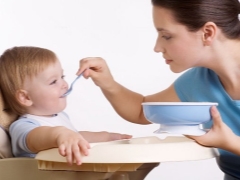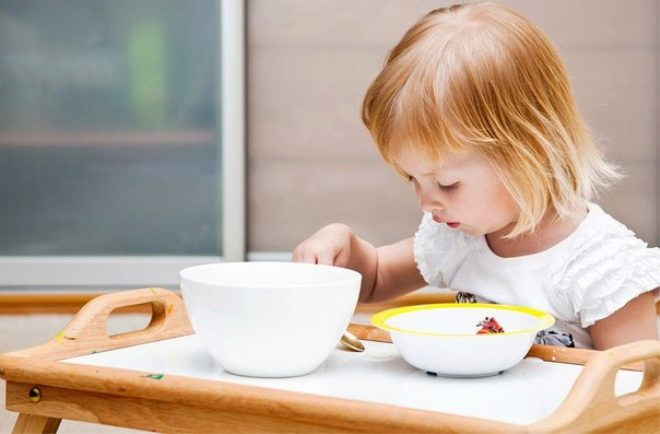Diet for intestinal infections in children: a suitable menu
Diet for intestinal infections is aimed at restoring nutrients and salts lost as a result of repeated vomiting and diarrhea. The rapid loss of children's body water after heavy liquid stool can lead to serious disruption of the entire gastrointestinal tract.
Causative agents
Intestinal infections are among the most common diseases in children. Almost every third child gets sick in summer. The peak incidence of intestinal infections occurs in the summer. Very often, the child can catch the disease after eating poor-quality food or poorly washed fruit.
Another common cause of the disease is the ingestion of water from water during bathing. Baby, splashing in a river or lake, can taste the water. A small amount is enough for infection. In the sea, the concentration of pathogens can also be very high.
If the reservoir is with stagnant water, the risk of infection increases several times. In the warm season, various disease-causing bacteria actively grow and multiply.
The most common intestinal infections are:
- Different types of viruses. These can be rotaviruses, adenoviruses and many other species. Once in the baby’s body, they quickly enter the bloodstream and cause an infection. The development of the disease when infected with viruses is usually rapid (sometimes after 6-8 hours from the moment it enters the blood).
- Pathogenic bacteria. Often there is infection with salmonella, shigella, dysenteric bacillus, Proteus or Escherichia coli. They usually cause severe watery diarrhea. The number of feces can reach 10 times a day. The child becomes capricious, refuses to eat.
- The simplest. They cause intestinal disorders much more often. The most common pathogens are amoeba or balantidia.
Children suffer from intestinal disorders more often than adults. This is due to the imperfection of the structure of their digestive system. Immunity of the child is very labile. He is not always able to resist the aggressive effects of bacteria. If a child is weak or has recently had any cold, he can easily become infected with an intestinal infection.
Principles of nutrition
Doctor Komarovsky believes that with any intestinal disorder, a therapeutic diet is the most important condition for a quick recovery of the baby. During the acute period of intestinal upset, food should be fed at a comfortable temperature for digestion. It should be chopped.
See the video below for details.
The main principles of therapeutic diets for infectious intestinal disorder:
- Compliance diets within a month. The first week is aimed at restoring the volume of fluid lost by the body. The purpose of the diet at 2-3 weeks is to introduce the necessary electrolytes, vitamins and microelements into the body. Their level drops dramatically after profuse vomiting and diarrhea. From the fourth week, they are already moving to the full familiar table, consolidating the effect obtained from the treatment.
- Be sure to stop vomiting. If the body of the baby continues to lose water through vomiting or diarrhea, it is useless to drink the baby. In such cases, need antiemetic drugswho are appointed by the pediatrician.It must be remembered that all drugs have side effects.
- Eat should be in small portions, but often enough. This will not contribute to increased vomiting or loose stools. It is better to feed the child at the same time, strictly by the hour.
- Fasting with intestinal disorder is unacceptable! On the first day, children should cut all portions exactly half. Hunger will only weaken the child's body, which at this time so need an adequate supply of vital nutrients and energy.
- It is better to give preference to food that is sufficiently crushed. Well suited mashed potatoes or carrots. If the child likes broccoli or cauliflower, feel free to add them to the menu. Meat should also be minced. Scroll it several times through a meat grinder with a medium-sized grill. You can also grind everything in a blender. It will be an excellent base for cooking meatballs or meatballs.
- The basis of nutrition should be protein products. During the acute period of an intestinal infection, it is better to give preference to meat products that are quickly digested and digested. It can be stewed dumplings with grated rice for a side dish or light soup with chicken meatballs.
- Cook in a double boiler or multi-cooker. It is allowed to use the roasting method in the oven. All fried or grilled foods are not the best choice. They can damage the inflamed intestinal wall, increasing diarrhea.
- Observe the temperature mode of serving dishes. Cooked food should be cooled to 40-45 degrees. Strongly chilled or cool drinks should also be excluded. They significantly intensify the passage of food through the intestines, thereby increasing diarrhea.
The diet of the child with intestinal disorders in acute form
The best choice during the acute period will be cooking porridge on water. Cow's milk is better not to add. If the baby is still a baby, but already receives lures, then you can dilute the crushed porridge with mother's milk.
You can safely cook buckwheat, corn, oatmeal. Choose crushed flakes, not whole grains. They are easier to digest and will not be able to scratch the irritated intestinal wall. In the first days of porridge will have to cook a lot. By consistency, they should be quite liquid, more like soup. Then it is no longer required. Boil baby porridge. Some add grated vegetable or fruit puree. Food can be slightly salted.
Be sure to include in the diet of meat products. Try to have them in the menu at least 1-2 times a day. Chicken mince cutlets will be an excellent base for lunch. On the side, you can add vegetable puree of permitted vegetables or boiled porridge. It is better not to give piece meat to small children. Weakened after repeated vomiting, the stomach can not split it. It can even provoke pain in the baby’s tummy.
On the 7-10 day you can enter into the diet of dairy products. Start with a small amount. 1-2 teaspoons at a time is enough. You can choose low-fat cottage cheese, kefir or yogurt, enriched with lacto-and bifidobacteria. They will help restore normal microflora in the intestines. It is necessary to enhance immunity in the fight against intestinal infections. Pay attention to the fact that all dairy products are fresh. Poor food can significantly increase diarrhea or cause indigestion.
Do not forget about enough liquid. The body of a child as a result of severe vomiting or diarrhea is very dehydrated. To compensate for the water and electrolyte balance requires a large amount of water. You can give your baby simple cooled to room temperature water.
Various fruit drinks and compotes will do. They can be made from dried fruits or berries. If the child has severe diarrhea, do not add prunes to the compote to normalize the stool.
What products should I avoid?
Some foods should be completely excluded from the diet of the sick child (especially in the first 2-3 weeks after the onset of the disease). Extend the table and bring the menu to its previous level in three weeks.
The following products may cause harm:
- Milk. Milk consumption in the first 2 weeks is strictly prohibited. Dairy whole foods can cause increased diarrhea. During this period, the damaged intestine cannot break down all the components of milk well. After drinking a glass of milk, the child's stool becomes more frequent, and there is pain in the abdomen.
- Fatty and heavy food. The enzymatic ability to break down fatty foods during intestinal disorders is significantly reduced. The body directs all the forces to fight the pathogen. He absolutely lacks the strength to digest fatty foods. Undigested food components are excreted through the intestines along with abundant loose stools. Diarrhea increases, nausea rises.
- Fresh bread, as well as any baking. It contains a huge amount of gluten. It sticks together all the villi of the intestines, making it difficult for the food to move. This can significantly enhance the fermentation and putrefaction in the body. Choose should be dried yesterday crackers. They will be an excellent addition to the broth, cooked from lean chicken, fish.
- Fresh fruits and vegetables. It is better to bake them with dried fruits in the oven (you can also boil them beforehand, and then chop them up into a mashed potatoes). To taste add some sugar. It will be an excellent alternative to the purchase of mashed potatoes in jars.
- Spicy and sour dishes. A large number of spices is very irritating to the inflamed wall of the stomach. It provokes vomiting and increases nausea. Do not add onions and garlic to meat dishes. They irritate the intestinal wall, increasing the inflammatory process.
- Confectionery. Cakes, pies, chocolate increase the load on the liver. This prevents the body from fully neutralizing toxins that secrete bacteria during reproduction.
- Strong meat broths. They contain too many extractive substances that increase nausea. Very poorly digested. Cause enzymatic pancreatic insufficiency (up to acute pancreatitis).
- Legumes and cabbage in any form. They lead to severe gas formation. The intestinal wall from the gases is stretched, increasing the pain syndrome. A child’s belly becomes like a drum, and touching it is painful.
Recipes for quick recovery
Chicken Soup with Meatballs and Cauliflower
Cook low-fat chicken broth. Pre-remove the skin and remove all the films from the chicken. Ready meat pull out of the broth. Scroll it 2 times in a meat grinder with a fine grid. Add a little salt and 1 egg. Form small meatballs.
In boiling broth add a couple of cauliflower blossoms and 1 potato, cut into small cubes. Boil all 10-15 minutes. When the vegetables are soft, they are ready. Turn off the stove. Blender chop all the ingredients. It should make a cream soup.
In the cooled soup, add 2-3 meatballs before serving. This soup can be eaten with wheat crackers.
Baked pear fruit puree
Wash and dry the pears well. Remove the skin from them, remove the core and the stem. Cut the pears into halves.
Take a baking sheet, cover it with baking parchment and lightly grease with butter. Put the pears on the parchment, sprinkle with powdered sugar on top. Bake them for 15-20 minutes at 180 degrees.
Cool, then wipe through a sieve. Puree will be a great addition to boiled rice porridge or cottage cheese.
Any intestinal infection is dangerous in that it can cause severe disorders in the children's body. Remember that at the beginning of the disease you should definitely call the pediatrician at home. You will discuss with him the tactics of treating a child and see if you need special medication.
The medical diet will help to correct and restore the lost fluid and nutrients necessary for the growth and development of the baby.
You will learn more about the treatment of intestinal infections by looking at the transfer of Dr. Komarovsky.



















